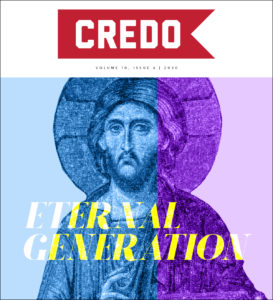
Why Eternal Generation Matters
T he new issue of Credo Magazine focuses on the eternal generation of the Son. The following is an excerpt from one of the issue’s featured interviews with Bradley G. Green. Green is is Professor of Theological Studies at Union University. He is the author of several books, including The Gospel and the Mind: Recovering and Shaping the Intellectual Life (Crossway, 2010), Colin Gunton and the Failure of Augustine: The Theology of Colin Gunton in Light of Augustine (Wipf and Stock, 2011), and Covenant and Commandment: Works, Obedience, and Faithfulness in the Christian Life, New Studies in Biblical Theology, (IVP Academic, 2015).
he new issue of Credo Magazine focuses on the eternal generation of the Son. The following is an excerpt from one of the issue’s featured interviews with Bradley G. Green. Green is is Professor of Theological Studies at Union University. He is the author of several books, including The Gospel and the Mind: Recovering and Shaping the Intellectual Life (Crossway, 2010), Colin Gunton and the Failure of Augustine: The Theology of Colin Gunton in Light of Augustine (Wipf and Stock, 2011), and Covenant and Commandment: Works, Obedience, and Faithfulness in the Christian Life, New Studies in Biblical Theology, (IVP Academic, 2015).
It is not uncommon to read contemporary works of theology, wherein the doctrine of eternal generation is dismissed as irrelevant speculation. In the estimation of some, we need feel no allegiance to an esoteric doctrine that is more “Greek-philosophical” than “biblical.” And if the doctrine does hang onto the Christian tradition like an odd appendage that serves no other purpose than to illustrate the strange mutations in church history, discarding it may seem entirely appropriate. However, in this instance we may answer the call to retire eternal generation in the spirit of G.K. Chesterton
There exists in such a case a certain institution or law; let us say, for the sake of simplicity, a fence or gate erected across a road. The more modern type of reformer goes gaily up to it and says, “I don’t see the use of this; let us clear it away.” To which the more intelligent type of reformer will do well to answer: “If you don’t see the use of it, I certainly won’t let you clear it away. Go away and think. Then, when you can come back and tell me that you do see the use of it, I may allow you to destroy it.” (G.K. Chesterton, “The Drift from Domesticity” in In Defense of Sanity: The Best Essays of G.K. Chesterton)
In this interview, theologian Bradley Green helps us think through the importance of eternal generation, and why it is so essential we maintain it, especially in a day so unfamiliar with the rich Trinitarian heritage of our fathers.
Why is eternal generation so indispensable to Christian theology?
The term or concept “eternal generation” denotes that the Son was generated from the Father from all eternity. The basic idea is that the Son is indeed “from” the Father (i.e., the Son is “born” of the Father), but that the Son has always been. I think it is these two principles that are at the heart of eternal generation: (1) the Son is from the Father (the Son is generated from the Father); (2) the Son is eternally the Son of the Father.
A mistake on the person of the Son causes a rupture across one’s theological system—especially in one’s doctrine of God. Click To Tweet I still remember reading Athanasius on this for the first time. I think one of the most important theological realities to keep in mind is what Athanasius said: if the Son is not eternally the Son, then the Father is not eternally the Father. One does not have the option of simply sequestering one’s doctrine of the Son from the rest of one’s theology. A mistake on the person of the Son causes a rupture across one’s theological system—especially in one’s doctrine of God. Again, if the Son is not eternally the Son, then the Father is not eternally the Father.
How would you answer the charge that eternal generation is an extra-biblical concept and is therefore unnecessary for Christian theology?
It is a classic example of a theological construct which emerged from Christians wrestling with Scripture in the light of various attempts to make sense of who the Son is. That is, as persons offered various understandings of the Son (for example, the Arians, who said the Son had a “like” or “similar” essence—homoiousios—to the Father) Christians turned to the Scriptures. Then, with various challenges (e.g., the Arians) in mind, Christians tried to make sense of Scripture. They formed this or that theological construct (here the notion of “eternal generation”) as something which the Scriptures pointed to, or entailed. And this is very important to grasp, and why systematic theology is so crucial. At the end of the day, Christians must ask a basic question: Does attention to Holy Write rightfully and properly lead one to engage in systematic theological conclusions and constructs? I think it does.
Does eternal generation not only safeguard theology against the subordination of the Son, but also help us honor the Father as unbegotten?
Eternal generation reminds us that while the Son does indeed “come from” the Father, the Son is also eternal. The Son is eternally the Son, and the Son is eternally divine. The Christian—in affirming eternal generation—is not trying to somehow bypass mystery, but is standing right in the center of a mystery. The traditional Christian, in affirming eternal generation, is saying that the Son and Father are not the same person, but yet are equally divine and eternal. There is a uniqueness to the Father (He is unbegotten), and there is a uniqueness to the Son (he is begotten or generated).
How does eternal generation protect us from the extremes of tritheism on the one side and modalism on the other?
Eternal generation reminds us that who the Son actually is is inextricably linked to who the Father is. Click To Tweet That is a good question. Eternal generation reminds us that who the Son actually is is inextricably linked to who the Father is. That is, the Son is the Son of the Father. The Father is the Father of the Son. When that is kept in mind, it guards against the tritheistic temptation because we see that the Son and the Father are—in a sense—inescapably understood according to their eternal relations to the other. In terms of avoiding modalism (the idea that there is just one person wearing different “masks” at different times), eternal generation reminds us that there really are three persons—possessing the same essence or substance, but being truly different persons.
One of the giants of the patristic era is Augustine. Did Augustine have anything to say about eternal generation?
One of the joys of my doctoral studies was reading Augustine, and eventually writing a dissertation which focused—in part—on Augustine. One of the things I first learned from Augustine was how to think about who God reveals Himself to be in time to who God is in eternity. To be specific, how do I relate what I read in the pages of the Bible (especially the New Testament) with who God is in eternity.
Augustine is quite clear that the sendings in time reveal the relations in eternity. Now, a lot hinges on how far one pushes this. I think we are at least forced to say that there is a true theological “fit” between (1) the sendings in time (i.e. the Father sending the Son and the Spirit) and (2) the relations (of Father, Son, and Spirit) in eternity. That is, if there is not a fit between temporal sendings and eternal relations, then we cannot have confidence that who God reveals himself to be in the pages of Holy Writ actually comport with who he is in eternity. Augustine is quite clear that (1) the Father sending the Son in time reveals (2) the Father and Son’s relations in eternity (which is at least summarized as the Father generating the Son).
**Read the remainder of Bradley G. Green’s interview in the latest issue of Credo Magazine.

